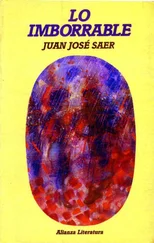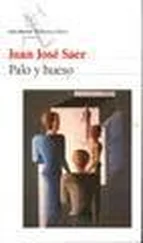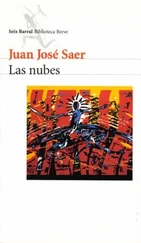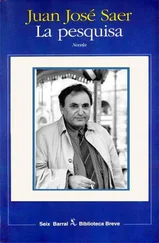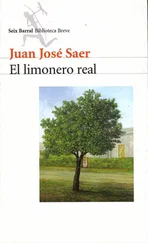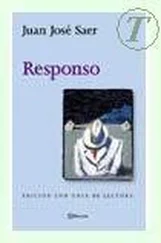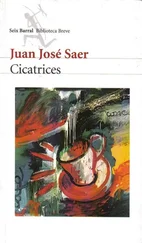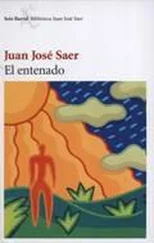We remained camped on the shore trying to make out, in the pitch dark, possible signs that would alert us to the fire’s advance. As our eyes grew accustomed to the dark, we began to distinguish the weightier silhouettes of the things that populated the general blackness. The nurses and I had gathered our patients to better watch over them. After a period of darkness, several candles and lanterns were lit, but the sergeant advised they be extinguished to better scrutinize the horizon from a deeper darkness. He allowed me to leave a pair of candles lit so that we might better keep watch over our mad. In truth, the only ones from which I expected some unrest were the elder Verde and the little nun; Prudencio Parra remained as indifferent as ever to the vagaries of this world, and the only sign of aggravation he showed under the circumstances was the tightening of his fist, and while Troncoso made a few slight starts of agitation, it was clear that the gravest lay behind us and a new paroxysm was unlikely for the moment. Moreover, El Ñato would not be detached from him, so I was certain I could count on him if something urgent arose. The devoted servant protecting the disgraced master who in ordinary times would torture and humiliate him. It is an eternal paradox that provokes, and will provoke, the philosopher’s eternal puzzlement. And with regard to Verdecito, there was no danger of losing sight of him amidst the general disorder, for not only did he stay by my side, he even clung to my shirtsleeve and would not let me go. He manifested his growing excitement in the multiplicity of sounds that left his lips, and, with an increasingly faint and shaky voice, he questioned me continually, such that even I, busy with the situation and intent on the outer world, could not understand him and answered without stopping to listen, especially in the direst of moments, with any old thing, which, as was his custom, he would make me repeat several times. Despite the increasing gravity of the situation, the nurses laughed at our deaf-men’s dialogue. The brothers Verde, I must note, were the two most difficult problems to manage in those trying hours, for as the danger approached, so, too did the elder’s excitement grow, and in tense moments, it was his perennial morning, noon, and night , spoken with the thousand different modulations of a normal conversation and directed to no one in particular, which was all that could be heard. The greater the peril, the stronger his voice rang out, and the more rapid the rhythm and variety of his utterances. Sister Teresita, who sometimes enjoyed pestering the two brothers, left them in peace that night, though her reasons were hardly commendable, for she passed a good part of the wait whispering and joking in the dark with the soldiers in her personal guard and, mostly because I thought the soldiers would see to her and protect her, I prudently refrained from discovering where those schemes might lead, even up to the point when, surrounded by the fire, we took shelter in the lake in water up to our necks because, in the part of the lake where she was squeezed in among the soldiers, splashes, cries, and all-too eloquent moans could be heard — and it is already known that, for mysterious reasons, danger may stimulate hedonism.
We were shaken by an unexpected fright when, almost immediately, an equally unexpected satisfaction made up for our shock. As we watched events unfold in near-perfect silence, alert and anxious, clustered on the lakeshore, we noticed a murmur that, at least for me, proved difficult to identify at first. It gradually coalesced into the pounding of cattle hooves as they sounded against the earth, just as a tumult of terrified lowing, each one closer than the last, filled the night air. Our main fear was that the cattle, which were of course fleeing the blaze, and which had to be in a rather large herd given the din they made, would stampede out of the blind terror that made them take flight into the dark, trampling over us. We heard the beasts approaching in the blackness when the first hooves touched water at some point on the lake’s far edge, and the watery sounds of their legs, more than the terrified moos resounding in the night (I felt Verdecito’s hand grasp yet more tightly at my shirtsleeve) made us think we would not escape catastrophe, when we realized the beasts were gradually going off to the western edge of the lake where there was more beach, some by water and others near the shore, until we heard them come across the lake and make off behind us, to the north, striking the earth with their hooves as they did. The explanation for that abrupt change of route came immediately, with the trot of a horse that drew near without difficulty, and which, with his gift for sounding the invisible, Osuna recognized by the hoof-beats as Sirirí’s. Reining in sharply at a distance, the Indian identified himself in the darkness and joined us. By lantern-light and in the middle of a circle of anxious, weary faces, he told us with characteristic seriousness how he had gone half a league south of our camp when he heard the cattle rushing to the lake, and so racing flat-out on the diagonal, he intercepted the mob and diverted it to the western point of the lake. There were only a few cows, Sirirí said, and so perhaps they would not have caused much of a disaster apart from the carts, but they were so frightened that they made enough noise for many more than they were in reality. What follows should illustrate these men’s skill for life on the plain, like sailors on the sea: Sirirí had agreed with Osuna and the sergeant to meet on the bank of the Paraná river, well to the east, but, after estimating the time it would take the fire to reach them and calculating the distance to the river, he had arrived at the same conclusion as the other two experts, deciding that the only place in the surroundings where we might defend ourselves from the blaze was that lake where we found ourselves. An important detail ought to be noted: Alone, Sirirí had been able to escape the fire with ease, as a rider can move about ten times faster than a convoy of carts. In little time, he had been able to gain such a lead on the fire that the blaze preparing to devour us had not posed the slightest danger to him. And nevertheless, knowing he would face the same danger as all of us, he returned to camp. Apart from the purely professional respect that Osuna and the sergeant perhaps deserved, none of the other members of the caravan roused the least sympathy. Over the month of our journey, Sirirí had heard us joke about him, had seen us trample the few things sacred to him in this world, the few truths in which, according to him, it was worth it to believe, and more than once, I had detected scorn, fury, and scandal written on his face when he judged some of our actions. And despite that, he endangered his life and came back to us. Likely, there was no doubt for him that the members of the caravan would burn for all eternity in the fires of hell; but in the face of the actual fire that approached, he had gone to our side.
At daybreak, the fire reached us. Protected by water, its age-old nemesis, we saw it stop and dance at the lakeshore. The front of the blaze stretched endlessly from east to west. The crackling flames were deafening, and greedy birds hurled themselves into clouds of smoke to eat the charred insects, excited by heat, danger, fire, and perhaps the abundance of food, letting out dreadful cries, unnatural in a bird, blackened by the night but suddenly illuminated by the flames’ glow, seemingly and suddenly risen from another world, another time, another nature with different laws than our own. The blaze lit up the entire countryside, which took on the excessive brightness of a rather flashy party, and the flames doubled when reflected in the lake, whose waters had turned an undulating orange color, so we who were within it, up to our necks in that reddened and flaming element, had the impression of being trapped in the very heart of the inferno, especially because, perhaps owing to the overheated earth and endless expanse of flames, our skin could detect the rise in water temperature to the point that we began to wonder — to ourselves, of course, for apart from the Verde brothers, who were impossible to silence, nobody spoke — whether it might begin to boil at any moment. The smoke, which at a distance appeared firm and sturdy as a wall, was a wildly writhing, turbulent fluid up close, and between its thick and agitated masses, changing color at every turn, furious columns of sparks and igneous material would rise up all at once to explode mid-air and split off in all directions like projectiles, flying and crackling over our heads or speeding past us, or into the water where they were extinguished and suddenly turned to tiny black bits that floated on the surface, or else, flying over the whole width of the lake, fell on the other side beyond the bank, where a number of little scattered fires had started to burn. Verdecito clasped at my neck and whispered incomprehensible phrases in my ear, one after another, but his older brother had stopped, fallen silent, and remained rigid and pale with terror, with the water up to his neck but his back to the flames, so as not to look at them.
Читать дальше



